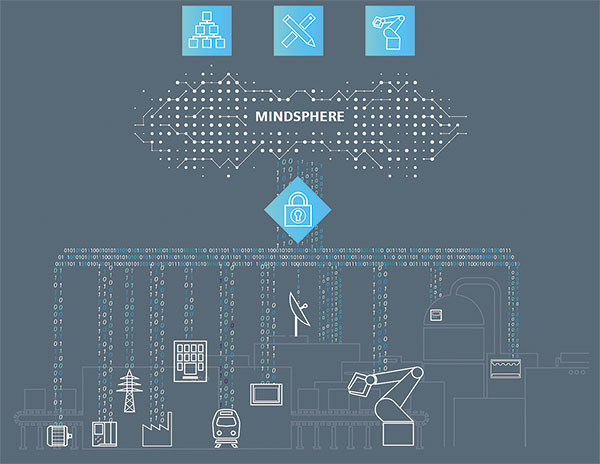Introducing SMEs to “Industry 4.0”
 |
It has been said that the focus of Industry 4.0 is the digitisation of the manufacturing industry. What’s your opinion?
The digital transformation of manufacturing forms part of Industry 4.0. This new, digital industrial revolution is unstoppable and will bring about many opportunities. Companies in the manufacturing and processing industries can benefit from increased productivity and flexibility and shorter times to market, thereby increasing their competitiveness. Their customers can benefit from more personalised, high-quality products. End users can order their very own merchandise tailored to their needs.
Let’s take an example of ordering a new car: How much horsepower do you want? Do you want a diesel or a gasoline engine? Or maybe electric? The choices don’t stop there, you can choose your favourite colour and the type of upholstery. You can even decide to have a sunroof if you like, and select the right entertainment system. These choices alone are emblematic of the highly complex nature of automobile production processes. For quite some time, car manufacturers have been relying on digital tools to help keep these processes under control.
Digitisation makes the inherent complexity of producing cars significantly more manageable – and it helps save money. Volvo, for example, was able to halve its engineering costs by using a software solution to plan and simulate its production lines. And Japanese car manufacturer Nissan managed to almost halve its development time for a new vehicle by using Siemens CAD and collaboration software.
As these examples show, the real and virtual worlds are now beginning to merge in the production world. This is Industry 4.0.
 |
| With digitalisation on the rise, small- and medium-sized firms must bulk up their technology to avoid being left in the dust |
Large manufacturers are reaping the benefits of digital technologies, while small- and medium-sized enterprises (SMEs) remain slow to embrace them. Could you share some insights on this scenario in Germany and Europe? What are the solutions?
In Germany, four out of five SMEs have invested in digital projects over the past three years, according to a study commissioned by KfW Group. However, these investments are modest in their scope. SMEs are still a long way from fully mobilising the potential of digitisation. Less than a fifth of German SMEs have become digital leaders through investments in digital products, services, or apps.
As a strong economic force, it is imperative that SMEs invest in digitisation. In EU countries and Norway, SMEs account for around two-thirds of total employment, and contribute more than half of the value added to the economy. If this sector falls behind, the consequences could be dire. Therefore, initiatives have been launched in many industrialised countries to help SMEs make the transition.
The general aim of these programmes is to encourage companies to make greater investments in digital technologies. A starting point for many SMEs on the digital path is cloud solutions. According to KPMG and Bitkom Research, more than 50 per cent of German companies already report using cloud solutions. In industrial settings, cloud solutions can be used for predictive maintenance, energy data management, or resource optimisation. All these applications have a proven ability to help manufacturers save money.
 |
| Siemens looks to reshape Industry 4.0 through the use of cloud computing and IoT |
Do you think Vietnamese SMEs will be able to benefit from Industry 4.0 and how?
SMEs play in important role in Vietnam’s economic development. According to the Vietnam Association of Small and Medium Enterprises, the country currently has more than 500,000 SMEs, which are responsible for 50 per cent of GDP, 33 per cent of the state budget, and over five million jobs. Yet they are vulnerable for a number of reasons including inadequate technology, low productivity and competitiveness, small-scale production, and a lack of capital.
I think if they are not well prepared before Industry 4.0 sweeps in, they will encounter numerous difficulties. On the other hand, Industry 4.0 can be a great opportunity for SMEs if they are willing to play the game. And we, Siemens, can help here with MindSphere.
MindSphere is the open, cloud-based Internet of Things (IoT) operating system that lets you connect your machines and physical infrastructure to the digital world. It lets you harness big data from billions of intelligent devices, enabling you to uncover transformational insights across your entire business. Moreover, MindSphere provides customers and developers with the capability to develop applications and digital services, apply them, and make them available to other users. In this way, totally new service and business models are possible.
I’m very pleased to share this very exciting news: Siemens will be setting up a digitisation hub in Singapore to address the substantial opportunities in urbanisation and industrialisation that are rapidly arising in Asia. At the hub, Siemens will develop innovations for IoT and Industry 4.0 in collaboration with its customers in Southeast Asia. Siemens will be usings its IoT operating system MindSphere to drive digitisation in Asian countries, including Vietnam.
In Vietnam, Siemens recently signed two memoranda of understanding with FPT on becoming a MindSphere and Product Lifecycle partner. We are also working with the Ministry of Industry and Trade on an education and training partnership with respect to Industry 4.0.
What the stars mean:
★ Poor ★ ★ Promising ★★★ Good ★★★★ Very good ★★★★★ Exceptional
Latest News
More News
- State corporations poised to drive 2026 growth (February 03, 2026 | 13:58)
- Why high-tech talent will define Vietnam’s growth (February 02, 2026 | 10:47)
- FMCG resilience amid varying storms (February 02, 2026 | 10:00)
- Customs reforms strengthen business confidence, support trade growth (February 01, 2026 | 08:20)
- Vietnam and US to launch sixth trade negotiation round (January 30, 2026 | 15:19)
- Digital publishing emerges as key growth driver in Vietnam (January 30, 2026 | 10:59)
- EVN signs key contract for Tri An hydropower expansion (January 30, 2026 | 10:57)
- Vietnam to lead trade growth in ASEAN (January 29, 2026 | 15:08)
- Carlsberg Vietnam delivers Lunar New Year support in central region (January 28, 2026 | 17:19)
- TikTok penalised $35,000 in Vietnam for consumer protection violations (January 28, 2026 | 17:15)
















 Mobile Version
Mobile Version